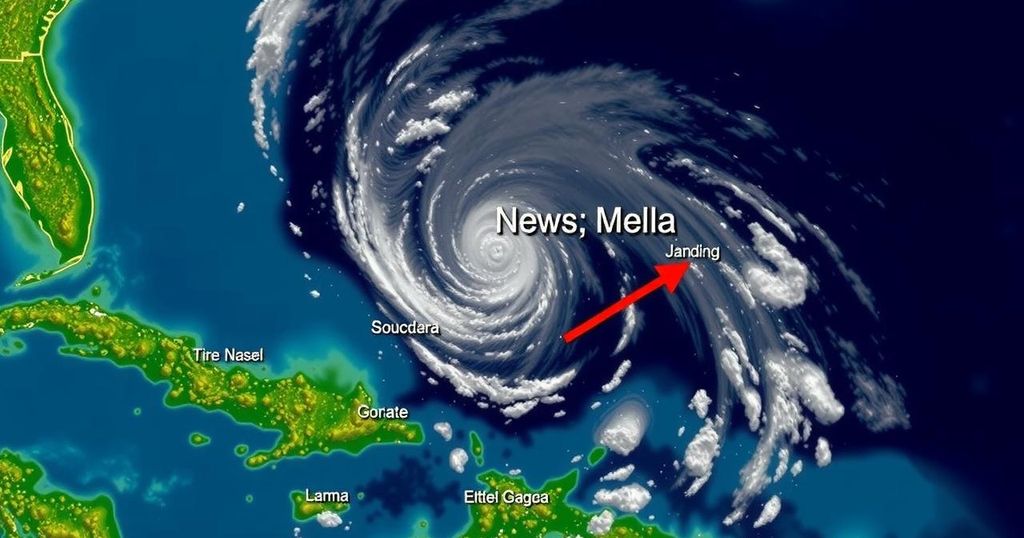Declining Odds for Tropical Storm Nadine Development
The likelihood of a low-pressure system in the Atlantic developing into Tropical Storm Nadine has significantly decreased, with current chances at 20 percent for the next 48 hours and 30 percent over the next week. The system, AL94, remains disorganized and faces strong winds that could curtail development. While it is expected to bring rain and gusty winds to northern Caribbean islands, the U.S. does not anticipate any impacts from this system under current conditions.
Recent updates indicate a decline in the likelihood of a low-pressure system in the Atlantic Ocean evolving into Tropical Storm Nadine. The National Hurricane Center (NHC) has been tracking the system, identified as AL94, which originated off the west coast of Africa and has exhibited fluctuating development potential over the past week. As it currently sits east of the Leeward Islands, the chances for development have dropped significantly from a peak of 60 percent earlier in the week to only 20 percent in the next 48 hours and 30 percent over the coming week. Despite the diminishing probabilities, there is still a possibility of gradual development; however, strong upper-level winds may inhibit this progression in the following days. The NHC has noted that showers and thunderstorms associated with the system remain disorganized. Travel of the disturbance is towards the west-northwest at approximately 20 mph, with expected rainfall and gusty winds impacting northern Caribbean areas, including the Virgin Islands and Puerto Rico. The NHC further commented on the situation, stating, “Showers and thunderstorms associated with a trough of low pressure located a few hundred miles east of the Leeward Islands remain disorganized.” Furthermore, meteorologist Tom Kines of AccuWeather remarked, “The chances of this developing into a tropical storm or even a hurricane seem to have diminished over the past couple of days. Having said that, there’s still a window that this could develop. If it’s going to do it, it’s got to do it in the next two, maybe three days.” At present, the U.S. does not anticipate any adverse effects from AL94, which is reassuring news for Florida, especially after the recent impacts of major hurricanes. As of the latest reports, there are no active named storms within the Atlantic, but experts caution that the 2024 Atlantic hurricane season remains ongoing, with optimal conditions for storm formation persisting. In addition to AL94, meteorologists at the NHC are also monitoring another low-pressure system located in the western Caribbean, which might develop; however, similar low chances of intensification are expected.
The article discusses the trajectory and current status of a low-pressure system in the Atlantic Ocean, identified as AL94, which may potentially develop into Tropical Storm Nadine. The National Hurricane Center (NHC) has been observing this system, noting its disorganized nature and the impact of strong upper-level winds that could thwart any development. For context, the article highlights that while odds of formation have decreased markedly, the system still poses a risk for heavy rainfall and gusty winds to certain Caribbean islands. Additionally, it underscores that although there are no current active named storms, the hurricane season is still in progress and potential future development remains a topic of concern.
In conclusion, the potential for a low-pressure system in the Atlantic to develop into Tropical Storm Nadine is increasingly unlikely, with recent assessments indicating low probabilities of such an event occurring in the near term. The NHC’s ongoing monitoring efforts reveal that the system remains untapped in terms of significant development due to disorganized conditions and adverse winds. Nevertheless, the system is still expected to bring some adverse weather conditions to parts of the Caribbean, although the U.S. is projected to remain unaffected. The analysis serves as a reminder of the complexities of hurricane monitoring during the ongoing Atlantic hurricane season.
Original Source: www.newsweek.com




Post Comment